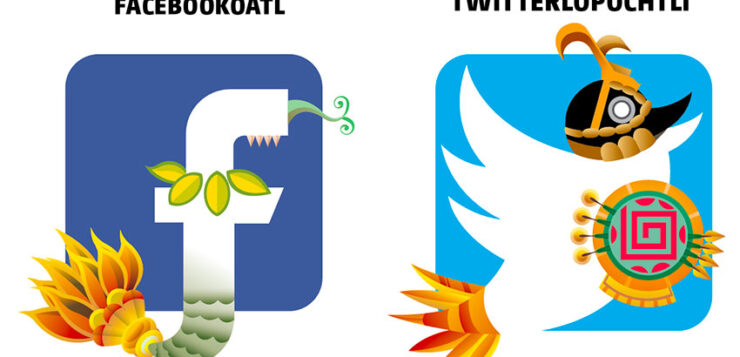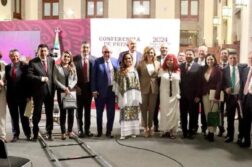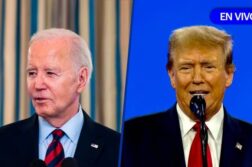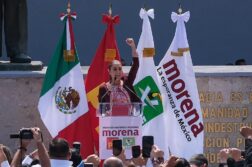Facebook and Twitter have become ‘global institutions of censorship’
A week after his United States counterpart was kicked off Facebook and Twitter, President López Obrador on Wednesday floated the idea of creating a national social media network to avoid the possibility of Mexicans being censored.
Speaking at his regular news conference, AMLO, as the president is best known, instructed the National Council of Science and Technology (Conacyt) and other government departments to look at the possibility of creating a state-owned social media site that would guarantee freedom of speech in Mexico.
“We care about freedom a lot, it’s an issue that’s going to be addressed by us,” he told reporters.
n addition to Conacyt, the ministries of the Interior, Foreign Relations and Communications and Transportation as well as the federal government’s legal council should analyze the possibility of creating alternatives to the large global social media companies, López Obrador said.
“To guarantee freedom, for freedom, so there’s no censorship in Mexico. [We want] a country without censorship. Mexico [must be]a country of freedom. This is a commitment we have,” he said.
AMLO renewed his criticism of Facebook and Twitter – of which he is an avid user himself – for suspending the accounts of United States President Donald Trump, saying that they have turned into “global institutions of censorship” and are carrying out a “holy inquisition.”
Nobody has the right to silence citizens even if their views are unpopular, López Obrador said.
“Since they took these decisions [to suspend Trump], the Statue of Liberty has been turning green with anger because it doesn’t want to become an empty symbol,” he quipped.
“Freedom in the case of the United States is the First Amendment in their constitution,” López Obrador said, adding that when the constitution was created it couldn’t have been imagined that there would one day be private companies with the capacity to limit people’s right to freedom of speech.
The president’s proposal to create a national social media network triggered chatter about what such a site would or should be called. One Twitter user suggested Facemex or Twitmex, apparently taking his inspiration from the state oil company Pemex.
The newspaper Milenio came up with three alternative names and logos for uniquely Mexican sites, suggesting that a Mexican version of Facebook could be called Facebookóatl (inspired by the Aztec feathered-serpent god Quetzalcóatl), Twitter could become Twitterlopochtli (a riff on the name of Aztec war, sun and human deity Huitzilopochtli) and Instagram could become Instagratlán (tlán, which in the Náhuatl language means place near an abundance of something – deer, for example, in the case of Mazatlán – is a common suffix in Mexican place names.)

Milenio also spoke to technology experts about the viability of a national social network being created in Mexico.
“I don’t have any doubt that Mexico has the capacity to create its own social network,” said Ramón Sánchez, a political consultant in the areas of technology and communication.
He said Mexico could set an example for other countries around the world and expressed concern about the power of large social media companies to decide who should be silenced.
“We’ve allowed it to be transnational companies that decide if there is censorship or not and that’s very dangerous,” he said.
“What happens if Twitter says tomorrow that AMLO is publishing things that it doesn’t like? What happens if the president of Twitter censors the democratically elected president of Mexico? As we’ve relinquished our technological sovereignty and left our communication tools, even our information systems, in the hands of multinationals with private interests, we’ve relinquished our [right to]freedom of speech,” Sánchez said.
Rubén Darío Vázquez Romero, a technology analyst and columnist for the magazine Forbes, agreed that Mexico has the capacity to create its own social media network.
“It would be a very interesting democratic exercise because it would be a freer network; it’s a great opportunity to demonstrate openness to dialogue,” he said.
Some other tech experts pointed out potential pitfalls of a home-grown, government-owned social media site.
Octavio Regalado, a consultant who specializes in social media, said that it’s very unlikely that people opposed to the current government would sign up for a social network created by it.
Guillermo Pérezbolde, director of the digital consultancy firm Reputation Digital Institute, warned that a state-owned social media service could be an attractive target for hackers and therefore the government would have to invest heavily in security.
“Protecting information and the platform will be the expensive thing because they would have to host it on very secure servers,” he said.
Source: Milenio (sp)





